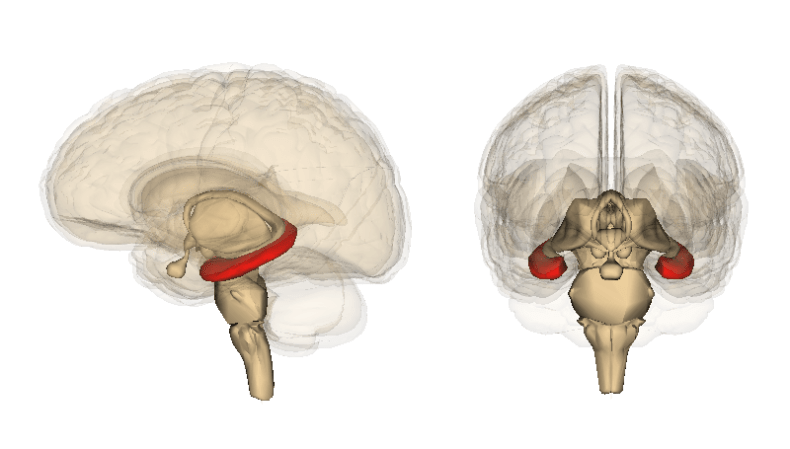For decades, neuroscience has shown that depression isn’t just a disorder of mood. Unquestionably, depression is also a disorder of brain structure and function. In particular, we know that depression can lead to shrinkage of the hippocampi in your brain. Now that’s an alarming piece of information! In fact, this is not a new finding. We have known for years that people with depression often have smaller hippocampi.
What are the Hippocampi?
We have two hippocampi in our brains, one on the left, the other on the right. It’s one hippocampus and two hippocampi. Hippocampus is Latin for seahorse. Consequently, in cross-section, a hippocampus looks like the curled tail of a seahorse. Our neural seahorses are to be found in the medial portion of our temporal lobes, as shown in the figure below. The brain’s seahorses play a crucial role in forming memories. Additionally, the hippocampi play a prominent role in mood, stress and emotional resilience. Importantly, a large body of MRI studies has shown that longer or repeated depressive episodes are linked with progressive hippocampal shrinkage. In the brain, shrinkage or volume loss is also called atrophy.
The Problem with Shrinkage of the Hippocampi
Why does this matter? It’s critical because hippocampal volume loss doesn’t just correlate with depression – it predicts worse treatment response, higher relapse rates, and poorer recovery. In other words, untreated or poorly treated depression can leave a lasting “scar” on the brain.

The Dementia Connection: Shrinkage of the Hippocampi
Furthermore, chronic depression is a risk factor for developing dementia. In Alzheimer’s disease, the first regions of the brain to become compromised are the hippocampi. Indeed, the earliest anatomical sign of Alzheimer’s disease is the same shrinkage of the hippocampi that we encounter in many depressed people.
You connecting the dots here? Therefore, depression causes damage to the same parts of the brain that are vulnerable in dementia. Without a doubt, that’s one of the neurophysiological reasons why depression sets you up to develop dementia!
The Good News: The Brain Can Regrow and Heal
The hippocampus is one of the few regions of the adult human brain capable of neurogenesis – the birth of new brain cells. Animal and human studies have shown that the right kind of stimulation can reverse hippocampal atrophy. Exercise, enriched environments, certain medications, and brain stimulation therapies all encourage growth.
Furthermore, there is now direct clinical evidence that vagus nerve stimulation (VNS) can achieve the same and reverse the shrinkage of the hippocampi. Without a doubt, that’s an incredible discovery.
New Clinical Evidence: VNS Increases Hippocampal Volume
A landmark study from the University of Padua followed patients with treatment-resistant depression who received implanted vagus nerve stimulation (VNS) therapy. Over 6 to 12 months, MRI scans revealed a progressive, statistically significant increase in hippocampal grey matter volume – growth that paralleled their improvement in mood and symptoms.
This is the first human study to show that VNS doesn’t just relieve symptoms of depression – it appears to repair the very brain structures damaged by the illness.
Although these researchers used surgically implanted VNS devices, the noninvasive version of VNS that we use at Ormond Neuroscience has the same effect. Critically, providing one knows the underlying neuroanatomy (which we do!), if we position the electrode correctly, then we are directly stimulating the vagal nerve. Furthermore, while some people might suggest that the invasive form provides more intense stimulation, research shows that gentle, not intense, stimulation of the vagus nerve achieves the best results.

Why Shrinkage of the Hippocampi Matters
- Depression damages the hippocampus. That results in smaller volume, less emotional resilience, and increased susceptibility to dementia.
- Standard antidepressants don’t always stop or reverse this shrinkage. Antidepressants only work in about 50%-60% of people. Furthermore, in about a third of those, depression will recur. Consequently, a large percentage of patients are resistant to antidepressants.
- VNS promotes hippocampal regrowth – a biomarker of genuine brain repair, not just symptom relief.
- The longer VNS is used, the more benefits accumulate. Studies show that patients continue improving even after one or two years of stimulation.
Ormond Neuroscience & VNS
At Ormond Neuroscience, we believe that brain health means more than “managing symptoms.” It means healing and rebuilding the brain itself.
That’s why we offer vagus nerve stimulation as a cutting-edge treatment option for depression, brain injury, and other neurological challenges. For patients who have tried medication after medication without lasting relief, VNS offers a scientifically grounded way to restore plasticity, protect memory, and regrow the very circuits depression wears down.
The Important Stuff
Depression can cause shrinkage of the hippocampi in your brain. Vagus nerve stimulation can help the hippocampi grow back and reverse atrophy.
If you or someone you love is struggling with depression, contact Ormond Neuroscience today to explore whether VNS could be the breakthrough you’ve been waiting for. This is especially important if the depression has not responded to medication.


